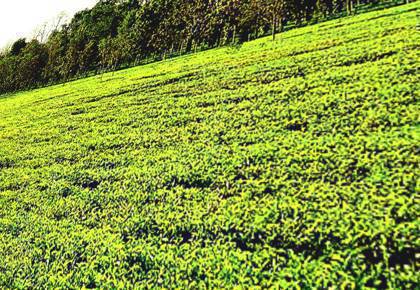


Insects are friend and foe both. It depends where you are standing. Pest attack is a major challenge in tea gardens, causing large-scale losses. Insect infestation can be controlled to some extent by spraying insecticides, but exposure to chemicals also affects the quality of the tea.
Due to the Corona lockdown , pesticides could not be applied in time in many tea gardens , due to which major tea companies had to suffer about 20 to 25 percent crop loss due to pest outbreak inAssam, Darjeeling and other tea garden areas in North East India.
Researchers at the Toklai Tea Research Institute in Jorhat, Assam, have developed a biological attack strategy against tea garden pests known to feed on the most prized tea stalks.
The Toklai Tea Research Institute, one of the world's oldest research centers on tea, recently released a swarm of friendly insects to one of the institute's experimental gardens.
These insects prey on harmful insects such as looper and tea mosquito, which are considered to be the biggest enemies of the tea bush in the region.
Raduvid (Cycanus collaris) rearing (Photo: TTRI, Jorhat)
Azariah Babu, director of the Toklai Tea Research Institute, said, "Raduvid (Sycanus collaris) insects are being used to destroy the enemy of tea. Raduvid insects are predatory in nature, and feed on loopers and tea mosquitoes." We believe this biological war against tea pests will be a long-term success story for the tea industry in India."
Previous studies have found harmful pesticide residues in tea, leading to calls to remove the pesticide treadmill from the tea sector in India, and to adopt an ecological farming approach.
Last year, international and domestic buyers rejected several consignments of tea from India due to the presence of pesticides and chemicals above permissible limits.
Azariah Babu says that the use of biological method supported by reduvid (Sycanus collaris) insects to control pests in tea bushes in India will reduce the load of chemical insecticides used for pest control.
He said that reduvid insects were previously part of the tea ecosystem. But, due to continuous use of insecticides in tea gardens, these insects almost disappeared.
The basic objective of this project is to reduce the pesticide load in Indian tea and improve the ecosystem of tea gardens. Under this, reduvid insects have been collected from the Dooars and Terai regions of West Bengal, which are being cultured in a laboratory of the Institute, and their behavior is being observed.
"An adult female reduvid moth can eat up to eight larvae of the looper per day," says Somnath Roy, an entomologist working at the Toklai Tea Research Institute.
Another successful experiment at Toklai found that seasonal flowering plants such as marigold, gladiolus and dahlia They are good insect repellents, especially for insects that feed on tea leaves. That is why these flowering plants are being planted among tea bushes.”
Planting these seasonal flowering plants in tea gardens will not only help in repelling pests, but also become an additional source of income for the tea garden owners.
This can be of particular benefit to small tea growers, who can earn additional income by selling these flowers during the winter season.
Toklai plans to involve small tea growers in this initiative, so that they can breed reduvid insects, which they can sell to larger gardens.
Small tea growers today play an important role in the Indian tea industry, accounting for more than 50 percent of the total production. "These insects are easy to rear and culture, which can be another source of income for small tea growers," said Roy.
Roy points out that many insects, which are considered enemies of tea leaves, are common food for creatures such as local mynas and bats.
He said, “We are trying to create an environment in tea gardens where birds that prey on harmful insects can return, and control the population of enemy insects. Attracting birds to gardens can help."
Emergency Manager talked with many people related with tea business. They welcomed these development. Nathmal Tebrewal,an tea connoisseur and prominent scholar of Tezpur, Assam, says " Every tea grower wants to reduce the use of pesticides in tea gardens. Where is the safe,cheaper and viable alternative to these pesticides?
Goverment must provide these organic solutions with subsidy. "
Somnath Roy says, “With such initiatives, it is our endeavor to develop such a system in tea gardens, in which the emphasis is on ensuring the use of natural weapons available in sufficient quantity to destroy harmful substances.”
Experts at Emergency Manager say that this development will change the tea industry.
It is to be seen that how Government is convincing and encouraging small and big tea growers to adopt it at large scale.
(based on feed by India Science Wire)
#teagarden #Assam #Darjeeling #insects #organicfarming #reduvid #SycanusCollaris #westBengal #TTRI